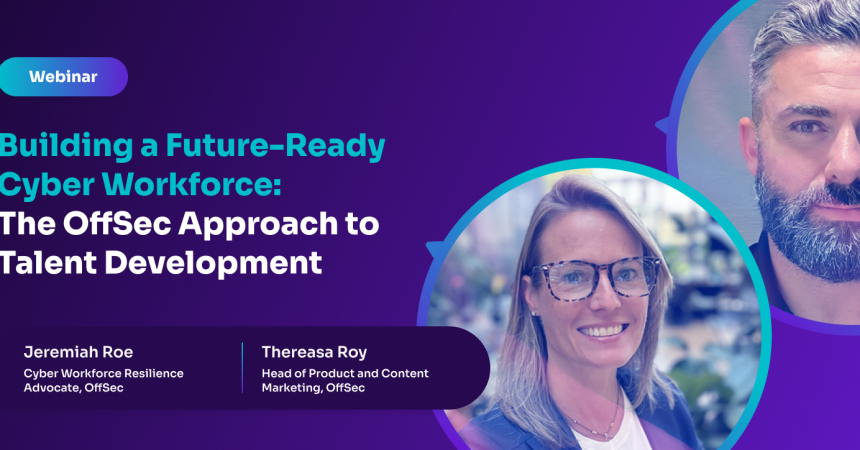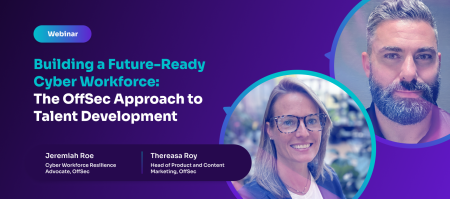Blog
Dec 13, 2024
Building a Future-Ready Cybersecurity Workforce: The OffSec Approach to Talent Development
Learn all about our recent webinar “Building a Future-Ready Cyber Workforce: The OffSec Approach to Talent Development”.
4 min read

In the webinar “Building a Future-Ready Cyber Workforce: The OffSec Approach to Talent Development”, speakers Thereasa Roy, Head of Product and Content Marketing at OffSec, and Jeremiah Roe, Cyber Workforce Resilience Advocate, discussed actionable strategies for addressing the global cybersecurity talent shortage.
With 3.4 million cybersecurity roles unfilled and human error predicted to account for more than half of significant cybersecurity incidents by 2025, organizations must focus on upskilling, mentorship, and retention to create resilient teams.
Organizations are facing a dual challenge: hiring new talent and upskilling existing employees, with most leaning toward the latter due to tighter budgets. Seamless and integrated assessments are critical for understanding team capabilities without disrupting workflows. Traditional methods, such as annual performance reviews, often fail to capture the dynamic needs of cybersecurity teams.
Jeremiah emphasized that live simulations and gamified environments, such as those offered by OffSec, provide effective alternatives. These tools not only assess skills but also prepare employees for real-world scenarios, bridging the gap between evaluation and readiness.
Thereasa and Jeremiah discussed the importance of employee upskilling and training in the context of business growth and security. They highlighted the need for quantifiable metrics to assess employee capabilities and the value of training programs like the T.R.A.C.K.W.I.S.E. methodology, which is a data-driven decision making methodology for quantifying the value of cybersecurity programs.
Upskilling programs are key to addressing skill gaps and fostering employee retention. OffSec’s Learning Paths allow organizations to create customized training plans for roles like SOC analysts or incident responders, focusing on areas such as scripting, cloud security, or network defense.
The conversation also underscored the importance of tying employee training to business impact and fostering a sense of involvement and importance among employees.
OffSec’s Versus platform offers a unique approach to training by simulating real-world cybersecurity challenges. In this gamified environment, red teams and blue teams compete to attack or defend corporate networks while maintaining operational continuity. Scenarios include managing user complaints about downtime, making the exercise as realistic as possible.
Jeremiah explained that Versus goes beyond skill development by fostering collaboration and camaraderie. Regular use of the platform—whether monthly or quarterly—helps teams build trust, identify gaps, and develop targeted training plans to address weaknesses.
Mentorship also plays a significant role in retention. Pairing experienced professionals with newer team members ensures knowledge transfer and fosters a supportive culture. Thereasa pointed out that mentorship provides employees with clear career paths, helping them feel valued and invested in the organization.
The cybersecurity industry benefits from hiring individuals with diverse backgrounds and transferable skills. People from fields like marketing or psychology bring unique perspectives and abilities, such as critical thinking and problem-solving, that are valuable in roles like reconnaissance or incident response.
OffSec’s SEC-100: CyberCore – Security Essentials course offers foundational training for those new to the field, providing a broad overview of areas like secure development, red teaming, and blue teaming. This program enables organizations to tap into non-traditional talent pools while equipping candidates with the knowledge they need to succeed.
Building a future-ready cybersecurity workforce requires a continuous cycle of assessment, training, and mentorship. Thereasa referred to this process as a strategic flywheel, where each phase reinforces the next, creating sustained growth and improvement. Organizations that adopt this model ensure their teams are not only prepared for today’s challenges but also capable of adapting to future threats.
The webinar “Building a Future-Ready Cyber Workforce: The OffSec Approach to Talent Development” underscored the urgency of addressing the cybersecurity skills gap. Tools like OffSec Versus, alongside structured training and mentorship programs, provide organizations with the resources they need to upskill their workforce and build a culture of resilience.
By focusing on diversity, continuous engagement, and tailored development, organizations can transform their teams into adaptive and collaborative defenders of the future. With the right strategies, the path to building a future-ready workforce is clear.
To listen to the full webinar, go here.

Sara Jelen
Sara Jelen is the Content Marketing Manager at OffSec. Through her extensive work as a writer and content marketer, Sara is specialized in the cybersecurity domain. With a background in anthropology and arts, Sara incorporates a human-centric perspective in exploring cybersecurity topics and the movers and shakers behind it.
Cybersecurity leader resources
Sign up for the Secure Leader and get the latest info on industry trends, resources and best practices for security leaders every other week
Latest from OffSec

Enterprise Security
Red Team vs Blue Team in Cybersecurity
Learn what a red team and blue team in cybersecurity are, pros and cons of both, as well as how they work together.
Dec 13, 2024
13 min read

Enterprise Security
Building a Future-Ready Cybersecurity Workforce: The OffSec Approach to Talent Development
Learn all about our recent webinar “Building a Future-Ready Cyber Workforce: The OffSec Approach to Talent Development”.
Dec 13, 2024
4 min read

Enterprise Security
How to Become the Company Top Cyber Talent Wants to Join
Become the company cybersecurity talent wants to join. Learn how to attract, assess, and retain experts with strategies that set you apart.
Dec 4, 2024
5 min read